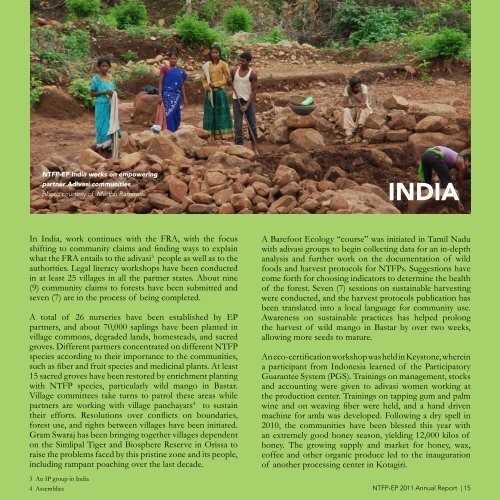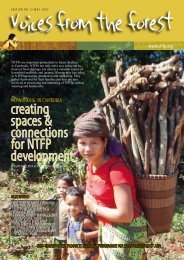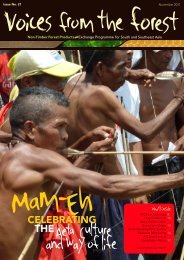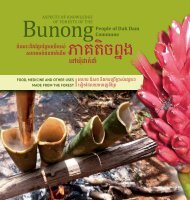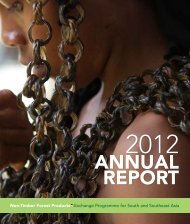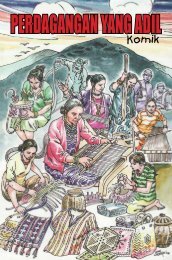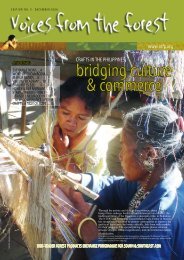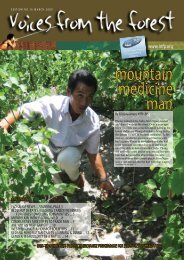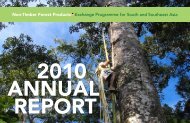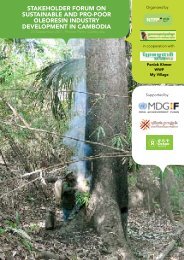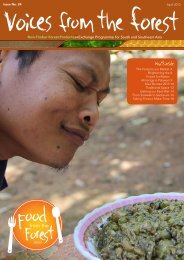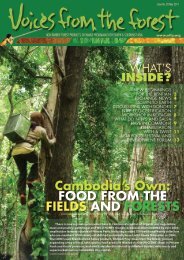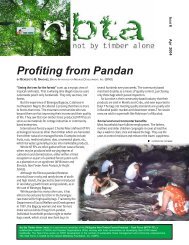Download PDF - Non-Timber Forest Products Exchange Programme
Download PDF - Non-Timber Forest Products Exchange Programme
Download PDF - Non-Timber Forest Products Exchange Programme
- No tags were found...
You also want an ePaper? Increase the reach of your titles
YUMPU automatically turns print PDFs into web optimized ePapers that Google loves.
NTFP-EP India works on empoweringpartner Adivasi communitiesphoto courtesy of Madhu RamnathINDIAIn India, work continues with the FRA, with the focusshifting to community claims and finding ways to explainwhat the FRA entails to the adivasi 3 people as well as to theauthorities. Legal literacy workshops have been conductedin at least 25 villages in all the partner states. About nine(9) community claims to forests have been submitted andseven (7) are in the process of being completed.A total of 26 nurseries have been established by EPpartners, and about 70,000 saplings have been planted invillage commons, degraded lands, homesteads, and sacredgroves. Different partners concentrated on different NTFPspecies according to their importance to the communities,such as fiber and fruit species and medicinal plants. At least15 sacred groves have been restored by enrichment plantingwith NTFP species, particularly wild mango in Bastar.Village committees take turns to patrol these areas whilepartners are working with village panchayats 4 to sustaintheir efforts. Resolutions over conflicts on boundaries,forest use, and rights between villages have been initiated.Gram Swaraj has been bringing together villages dependenton the Simlipal Tiger and Biosphere Reserve in Orissa toraise the problems faced by this pristine zone and its people,including rampant poaching over the last decade.3 An IP group in India4 AssembliesA Barefoot Ecology “course” was initiated in Tamil Naduwith adivasi groups to begin collecting data for an in-depthanalysis and further work on the documentation of wildfoods and harvest protocols for NTFPs. Suggestions havecome forth for choosing indicators to determine the healthof the forest. Seven (7) sessions on sustainable harvestingwere conducted, and the harvest protocols publication hasbeen translated into a local language for community use.Awareness on sustainable practices has helped prolongthe harvest of wild mango in Bastar by over two weeks,allowing more seeds to mature.An eco-certification workshop was held in Keystone, whereina participant from Indonesia learned of the ParticipatoryGuarantee System (PGS). Trainings on management, stocksand accounting were given to adivasi women working atthe production center. Trainings on tapping gum and palmwine and on weaving fiber were held, and a hand drivenmachine for amla was developed. Following a dry spell in2010, the communities have been blessed this year withan extremely good honey season, yielding 12,000 kilos ofhoney. The growing supply and market for honey, wax,coffee and other organic produce led to the inaugurationof another processing center in Kotagiri.NTFP-EP 2011 Annual Report | 15


